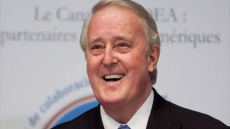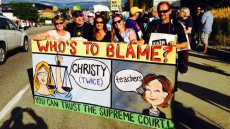VANCOUVER - The mood was bittersweet Thursday as British Columbia teachers cast ballots on a tentative contract deal that could bring down picket lines and put them back in the classroom.
The dispute dragged out for months, putting an early end to the last school year and delaying the start of the new one, but as details of the agreement emerged in meetings held across the province, many teachers felt there were few wins.
"I don't like this agreement," Robin Holburn, a music teacher at Prince of Wales Secondary in Vancouver, said following a packed meeting of Vancouver teachers at the Queen Elizabeth Theatre.
"Our negotiating team did the very best it could, I believe ... but this is not a good deal for B.C. students and it's not a good deal for B.C. teachers."
While receiving applause from thousands of teachers, the panel of B.C. Teachers' Federation negotiators bluntly admitted that some provisions of the deal were "not nearly enough."
Most importantly, class size and composition — the issue at the centre of a 12-year dispute between teachers and the provincial government — remain the same.
The provincial government has lost two B.C. Supreme Court cases over its 2002 decision to unilaterally remove class size and composition from the collective agreement. The government is appealing and a hearing is scheduled next month.
The Liberal government saved $3 billion over the years with that illegal action, Holburn said, and the fund to deal with grievances from that decision is not enough.
"They want to pay that off with $105 million. Three cents on the dollar," he said.
Study sessions were held across the province for federation members to learn more about the proposed six-year deal.

In Vancouver, teachers were told the meeting was not the proper venue for their personal anger.
There remained as many questions as there were answers as teachers tried to find out things like whether they will make up lost time from the strike and whether per-student funding improved.
Neither federation president Jim Iker nor Education Minister Peter Fassbender, both of whom became visibly more exhausted as the dispute wore on, made public appearances as teachers voted.
They were expected to comment when results were in soon after the polls closed at 8 p.m. local time.
Posters were taped up on walls and telephone polls along the streets around the Queen Elizabeth Theatre imploring the 4,300 teachers in Vancouver to vote against the deal.
"I'd rather work-to-rule than sign a contract with the devil," said one homemade sign. "Vote No with a clear conscience and wipe that smirk off Christy's face."
The teachers' last contract expired in June 2013.
The six-year deal includes a 7.25 per cent salary increase, improvements in extended health benefits and the teaching-on-call rates, as well as a $400-million education fund to hire specialist teachers.
If the agreement is ratified, teachers will return to the classrooms on Friday to prepare for the start of the new school year. Individual school boards will decide whether classes begin on Monday or Tuesday — three weeks behind schedule.

Ebru Montagano, a Grade 4-5 teacher at Bayview Elementary School in Vancouver, said she believes the vote will be close but it will be yes.
"It's not perfect, but it's good enough for now," she said.
That sentiment was echoed again and again.
"I'm just hoping we can go back to work," said Teresa Brown. "I think it's the best we're going to get."





